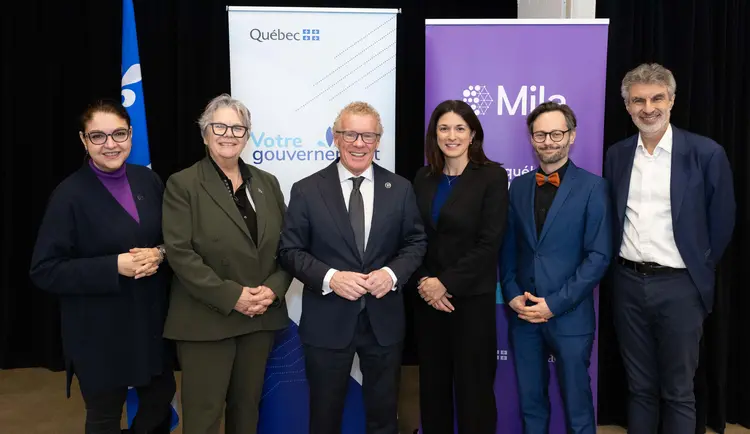
On Monday, August 22, 2022, Mila welcomed German Chancellor Olaf Scholz, a delegation of prominent business leaders and Canadian Prime Minister Justin Trudeau during the Chancellor’s three-day trip across Canada. In an effort to bolster science and innovation relations between the two countries, they met with leading Artificial Intelligence (AI) researchers and groundbreaking entrepreneurs at Mila to learn more about the institute’s commitment and leadership in the development of responsible AI across multiple spheres, ranging from climate change to health and drug discovery, and technology transfer.
“It is with immense privilege that we welcome the delegation to our spaces that were inaugurated with the vision of creating a distinctive ecosystem that pushes the boundaries of scientific research, propels exceptional young talents, inspires industry-led innovation, and contributes novel technologies to some of the greatest challenges of our time,” said Valérie Pisano, President and CEO of Mila.
Canadian Ministers François-Philippe Champagne, Minister of Innovation, Science and Industry; Mélanie Joly, Minister of Foreign Affairs; Jonathan Wilkinson, Minister of Natural Resources, who were also in attendance alongside German Chancellor Scholz and Robert Habeck, German Vice-Chancellor and Minister of Economic Affairs and Climate Action, the German delegation and distinguished guests, attended sessions on the potential of AI for saving and redistributing energy. Presentations on supply chain enhancement and building optimization were led by Scale AI CEO Julien Billot and BrainBox AI CEO Sam Ramadori.
The afternoon was also complimented by ground-breaking research presentations. Mila Professor David Rolnick led a talk on the potential of AI for climate change and Project Lead Adriana Eufrosina Bora presented AI Against Modern Slavery (AIMS). Mila’s Founder and Scientific Director, Professor Yoshua Bengio, and professors Alan Evans and Katrin Amunts, both leaders of the Helmholtz International BigBrain Analytics and Learning Laboratory (HIBALL), led a discussion on drug discovery and brain mapping and brought forth unique research collaborations between German and Canadian research centres.
“I think that we have so many important challenges in front of us as far as the whole planet is concerned, from pandemics and climate change to biodiversity loss,” said Yoshua Bengio during his opening remarks. “AI has the possibility of really helping us create solutions we haven’t seen before.”
Media contact
Marc-Antoine Guérard
Communications Advisor
marc-antoine.guerard@mila.quebec
M: (438) 936-7750





